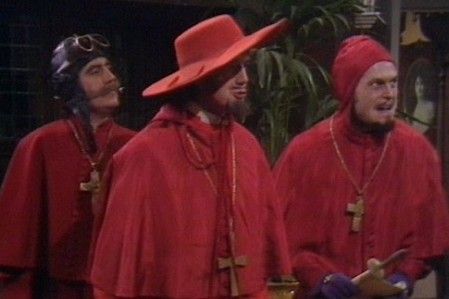 Charles Akins had an interesting post on an rpg campaign that fell apart. Here’s what happened:
Charles Akins had an interesting post on an rpg campaign that fell apart. Here’s what happened:
Last night I was reading Twitter, as one does, when I ran across one of the role-players in my feed talking about the game he was running. Apparently he was under the impression that the game he was running was actually an expression of radical truth philosophy and that in imposing that philosophy onto his players and world he was teaching them something profound. Unsurprisingly the game imploded a short while later and he was mystified.
So what happened here? Why did things go so terribly wrong? You’d think that would make for a good discussion in the gaming scene. Unfortunately… it’s not one that role-players are willing to have, by and large. You see… some people are so extreme in their brand of rpg ecumenism, they will attempt to shut down any attempt to analyze what actually works in a tabletop rpg session. It wouldn’t be that big of a deal, but… rpg’s are a real challenge to master as it is. Straight talk about this sort of thing could conceivably save novices from a great deal of unnecessary grief. Unfortunately, it’s next to impossible to make happen.
I tried to explain this to Lewis Pulsipher back at PrezCon a few weeks ago, but didn’t have any good examples of it at hand. (Really, any serious discussion of rpgs will run into this at some point.) Fortunately, my comment on Charles Akins’s post brought about the purest expression of this mentality that I have ever seen.
Here’s the full exchange:
Jeffro: Philosophy is the players’ domain. The GM presents a situation and puts the players on the horns of the dilemma. The players get to explore the consequences of their decision.
Benjamin Wenham: Save that the very formation of the dilemma can be formed out of a philosophocal question. As can settings, NPCs, rule systems, and Mosters. Oh, and there is nothing preventing a DM forming a conclusion of their own.
Jeffro: That’s not the GM’s job.
Benjamin Wenham: Last I checked there was no such thing as a standardised DMs contract. As such, I would suggest that the GMs roll changes by table, and making sweeping generalisations about what their job is takes us in the direction of wrong bad fun. Not that I am even sure that I begin to see why a GM drawing a conclusion about a scene he has placed before the PCs represents any kind of not fun or imposition on the PCs.
Jeffro: You don’t know what you’re talking about. You can write whole books about what Game Mastering is, what is the good and bad in it, and what works at the table. Your pose of broad-mindedness is not useful beyond its utility in shutting down discussion. It lacks the tempering that actual play would lend to even the most blinkered perspective.
Benjamin Wenham: Nope. My experience of actual play is that different tables play games differently. You want to say, my experience with groups that have X,Y, and Z characteristics tells me that A, B, and C, does not work for them, then you’ll be contributing something useful. But saying X is bad because reasons, when clearly their are whole sub-cultures of the RPG hobby that thrive on X, is in fact much more likely to shut down conversation, because it is suggesting they are having wrong bad fun.
Jeffro: Do you have session reports posted online somewhere?
Benjamin Wenham: Relivance?
Jeffro: You just don’t sound like you have an informed opinion on how role-playing games actually work.
This is one of the simplest (and perhaps entertaining) lessons of playing rpg’s that new players get to learn: The GM has absolute power and authority to do with as he pleases…. up until the point that the players tell him to piss off and select a new GM for their group.
The best GM’s are facilitators, the worst are dictators.
And players want to be cool dudes who kill people and break things with style. Sales numbers beat number of threads on rpg.net.
That is simply a delightful exchange. The referee is there to make sure the game is fun and involve all players, which involves judgement, not philosophy.
After all a player making his PC do ridiculous things may be enjoyable to one group and won’t break the game. In another group, the referee needs to step in.
The only ruling philosophy is “Play, participate and enjoy,” although minor philosophies will dictate guidance. A defensive minded GM will redirect goofiness, while a more momentum-focused one may encourage the goof to roll into a briarpatch. Still, good referees will keep the game focused on the players, regardless of their tendencies.
RPGs fail due to bad prep or referee ego problems.
The GM mantra should be “It’s about them.”
Being a DM is just like being in the rap game: let a player play.